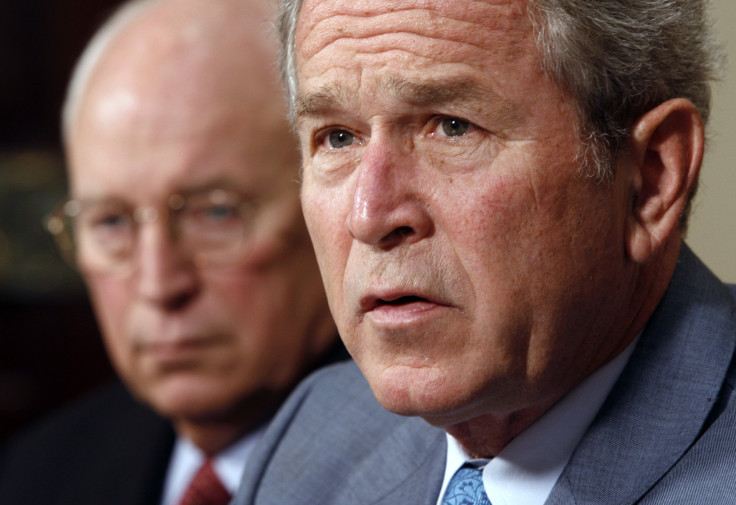CIA Torture Report: Did Bush And Cheney Lie?

A CIA torture report released Tuesday found that the agency misled Bush administration officials about the efficiency of enhanced interrogation techniques such as waterboarding, and that the officials, including then-President George W. Bush, in turn misled the public about the effectiveness of the techniques. Bush era officials have disputed that account. Below is a rundown of what the Senate Intelligence Committee's report had to say about some Bush administration officials.
President George W. Bush: Nearly two weeks after the Sept. 11, 2001, attacks, Bush signed a covert memo that “provided unprecedented authorities, granting the CIA significant discretion in determining whom to detain, the factual basis for the detention, and the length of the detention” of captives in the war on terror. But the memo made no mention of interrogations or what interrogation techniques would be used, the committee determined. In February 2002, Bush issues a memo that said al Qaeda and the Taliban were not prisoners of war under the Geneva Conventions, meaning that they didn’t need to be subjected to “humane treatment.” In October 2002, Bush was given an update on Abu Zubaydah, who at the time was the highest-ranking al Qaeda member captured by the U.S. The CIA told the president that Zubaydah “resisted providing useful information until become more cooperative in early August, probably in the hope of improving his living conditions.” The agency made no mention of torture techniques used on Zubaydah.
Also in 2002, Bush said he discussed the techniques with then-CIA Director George Tenet, according to his autobiography. But that account was disputed in a memoir by John Rizzo, the former acting general counsel for the CIA.
Bush publicly acknowledged that the CIA has secret detention centers around the world where they are keeping suspected terrorists for the first time in a September 2006 speech. The speech, which was based on CIA information vetted by the agency, contained “significant inaccurate statements, especially regarding the significance of information acquired from CIA detainees and the effectiveness of the CIA’s interrogation techniques,” the committee found.
In 2008, the Democratic-controlled Congress passed a bill outlawing the techniques, which Bush vetoed. The president used the CIA information in explaining his veto, but the agency’s “representations to the White House regarding the role of the CIA's enhanced interrogation techniques in the thwarting of the referenced plots were inaccurate,” according to the committee.
Vice President Dick Cheney: Cheney was on board with the interrogation program, including waterboarding, and believed the CIA “was executing administration policy,” the committee found. Cheney was told by the CIA that if the interrogation methods were disbanded, it “will result in loss of life, particularly extensive,” meaning American casualties. He was also told of numerous plots that were claimed to have been disrupted through use of the techniques, but the committee said those claims were later deemed “inaccurate.”
In March 2005, Cheney was told that attacks on the U.S. consulate in Karachi, Pakistan, and a plot to detonate a dirty bomb in Washington, D.C. were thwarted through interrogations of Abu Zubaydah. But a task force later found that other intelligence helped disrupt the plots.
A “major U.S. newspaper” was about to publish the location of a CIA black site, or secret prison where suspected terrorists were being held. Cheney urged the paper not to publish the information, and it didn’t, but the information alone led the Bush administration to shutter the black site, the committee said. The New York Times revealed Tuesday that it was the newspaper mentioned in the CIA torture report.
Attorney General Alberto Gonzales: Based on information given by Gonzales, a “brief description of the waterboard interrogation technique” that were contained in CIA talking points meant for Bush were eliminated from the document, meaning Bush never knew the specifics of how the CIA waterboarded detainees. But the committee said the revised talking points ultimately “were not used to brief the president.”
Defense Secretary Donald Rumsfeld and Secretary of State Colin Powell: Neither Rumsfeld nor Powell was briefed about the interrogation of Zubaydah in 2002, according to the committee. They weren’t briefed until a year later, in September 2003, at the urging of then-National Security Adviser Condoleezza Rice. The briefing lasted only 25 minutes.
© Copyright IBTimes 2024. All rights reserved.






















